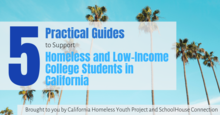Found 219 resources.
0
0
0
A building-level interactive map that shows where residential tenants face displacement pressure and affordable apartments are threatened across New York City. Monthly reports on new harassment and displacement risk in rent-stabilized buildings by Community District and color-coded by risk factors.
Topics: East Coast, Housing, Low-income, Stability
0
0
0
Through our conversations with King County, Seattle, Tacoma, and Vancouver Housing Authorities, as well as Home Forward, Portland’s housing authority, and partners from school districts, out-of-school time programs, and community-based organizations, we learned why they endeavored to better intersect housing and education, elements of a successful partnership, lessons learned, their challenges, and how the work can be replicated. We hope this will be a resource for other individuals and communities as they begin and strengthen partnerships of their own in order to improve life outcomes for...
Topics: CLPHA, Education, Housing, Out-of-school time, Partnerships, Place-based
0
0
0
The conditions in which people live, learn, work, and play affect health in myriad ways. State Medicaid agencies are increasingly exploring opportunities to address these social determinants of health (SDOH) in an effort to provide more efficient care and improve health outcomes. As states begin to support these efforts, they are thinking strategically about how best to align SDOH-related activities with other reforms — such as value-based purchasing, care transformation, and the development of cross-sector partnerships.
Topics: Health, Low-income, Medicaid / Medicare
 Shared by Housing Is
on Dec 19, 2018
Shared by Housing Is
on Dec 19, 2018 0
0
0
Housing and health systems need to work together. Public housing authorities (PHAs) are significant providers of housing to those in need, offering the health sector scale and expertise. Little was known about how PHAs worked with the health sector writ large. With a national survey, we found that PHAs across the country are engaged in a wide range of partnerships with different health organizations that address various target populations and health priorities. Barriers to housing-health collaboration, such as funding and staffing capacity, can be overcome with cross-system partnerships that...
Topics: Child welfare, Funding, Health, Housing, Low-income, Medicaid / Medicare, Partnerships, Preventative care, Research, Seniors, Smoke-free
 Shared by Housing Is
on Dec 19, 2018
Shared by Housing Is
on Dec 19, 2018 0
0
0
Long-term, sustainable financing is a major challenge for the majority of multisector partnerships, and the organizations aligned with them, in regions across the country. Many depend overwhelmingly on short-term sources of funding—namely, grants. It’s time to explore new financing frontiers!
Topics: Funding, Partnerships
 Shared by Housing Is
on Dec 17, 2018
Shared by Housing Is
on Dec 17, 2018 0
0
0
Karis Grounds, MPH, Vice President of Health and Community Impact at 2-1-1 San Diego, joined the podcast to discuss how she is supporting the strategic development of San Diego’s community information exchange (CIE), a technology platform that is enabling data sharing and collaboration between health and social service providers to deliver person-centered care and improve health equity. Grounds shared strategies for aligning multi-sector partners around a shared language and an integrated technology platform to deliver enhanced care coordination. She also discussed how 2-1-1 San Diego is...
Topics: Data sharing, Health, Partnerships
0
0
0

Prioritizing young children in Medicaid through cross-sector, innovative practice change has the potential to improve their lifetime trajectories, overall population health and long-run savings.
Topics: Child welfare, Early childhood, Health, Low-income, Medicaid / Medicare, Research
0
0
0
The Colorado Division of Youth Services is working to transform the family experience by taking a two-generation (2Gen) approach to the services it provides.
Topics: Child welfare, Dual-generation, Early childhood, Family engagement, Low-income, Partnerships, Stability
0
0
0

Using the story of Lily, a resilient, hopeful Muppet whose family is experiencing homelessness, Sesame Street developed a set of free, bilingual resources for children and families experiencing homelessness and the providers who serve them. Many different kinds of providers serve children experiencing homelessness, including school district homeless liaisons, early childhood programs, and homeless assistance and housing programs. To help these providers quickly and effectively leverage Sesame Street’s resources in the context of their specific work, SchoolHouse Connection has produced tip...
Topics: Child welfare, Education, Homelessness, Housing, Low-income
0
0
0
Activities and videos about homelessness for children and families
Topics: Education, Homelessness, Housing, Low-income
0
0
0
This report is intended as a practical tool for those seeking to understand how capital does and does not flow to communities, businesses, and households. This can inform efforts by community developers to identify projects in need of financing, raise capital, and design and market new financial products and services. We provide a concise how-to guide across five approaches to assessing community need, a four-step process to study capital flows, and eleven approaches to determining capital gaps. To help ground this, we provide examples drawing from original data about the Twin Cities of...
Topics: Asset building, Community development, Midwest, Stability
0
0
0
Denver’s expansion of supportive housing through the Denver Supportive Housing Social Impact Bond Initiative is beginning to pay off for the city of Denver, its homeless residents, and a group of investors banking on social impact. This fact sheet highlights interim results of the program.
Topics: Housing, Research, Supportive housing, West Coast
0
0
0
The 2018 Purpose Built Conference in Orlando, Florida from October 24 – 26 was a tremendous opportunity for thoughtful engagement and energetic conversations with Network Members and attendees from all across the country. Our panel of guest speakers represented a wide range of industries and brought unique perspectives and insights.
Topics: Community development, Education, Health, Housing, Low-income, Mobility, Partnerships, Place-based
0
0
0
People living just a few blocks apart may have vastly different opportunities to live a long life in part because of their neighborhood. Unfortunately, significant gaps in life expectancy at birth persist across many United States cities, towns, ZIP codes and neighborhoods. The latest estimates of life expectancy at birth reveals differences down to the census tract level. Explore how life expectancy in America compares with life expectancy in your area, and resources to help everyone have the opportunity to live a longer, healthier life.
Topics: Health, Housing, Low-income, Place-based, Research
0
0
0
With political divisions on the rise and global cooperation imperiled, city officials worldwide are stepping up to lead, solving local problems while sharing solutions and innovations across borders. Making cities such as New York, Pittsburgh, and Los Angeles inclusive, safe, and sustainable is vital to the future of the United States—and the globe. Driven by the need to act locally while thinking globally, a growing number of metro areas are adapting the Sustainable Development Goals (SDGs) as a blueprint for progress.
Topics: Community development, Housing, Partnerships, Place-based, Sustainability
0
0
0
Signs of digital distress: Mapping broadband availability and subscription in American neighborhoods
Broadband, especially wireline broadband in American homes, is the essential infrastructure for unlocking the internet’s economic benefits. However, broadband infrastructure is far from ubiquitous, both in terms of where it operates and who subscribes to it, and those deficits are not shared evenly across the country. As such, policymakers must understand how the national digital divide varies depending on the place.
Topics: Broadband, Education, Low-income, Mobility, Research
0
0
0
There were 33,889 homeless schoolchildren in Florida during the 2007–08 school year, including children temporarily doubled up with others and children staying in hotels, motels, shelters, transitional housing, and unsheltered locations. By the 2015–16 school year, that number had risen to 72,601. This report suggests that the rise is because of the recession and foreclosure crisis, the state’s increasing shortage of affordable housing, and school districts training teachers, counselors, and other staff to identify students with no permanent housing.
Topics: Data sharing, Education, Homelessness, Housing, Low-income, Research, South, Stability, Youth
0
0
0
More than a third of homeless people are part of a family, most of which are headed by women with at least one child. Homeless families are different from single homeless people, and their needs differ. But limited research focuses on these families. This study aims to fill the gap by exploring longitudinal health service use and expenditures for homeless family members before and after entering an emergency shelter.
Topics: Family engagement, Health, Homelessness, Housing, Low-income, Preventative care, Research, Stability
0
0
0
How should policymakers address the long-standing youth unemployment problem in Puerto Rico, which only worsened in the wake of Hurricanes Irma and Maria? After natural disasters, the government tends to focus its recovery efforts on infrastructure repairs and mental health services. But employment and economic security are equally important. With support from the W. T. Grant Foundation, MDRC partnered with Instituto del Desarrollo de la Juventud, or the Youth Development Institute, to develop recommendations that can create pathways into the workforce for young people and that are supported...
Topics: Low-income, Research, Workforce development, Youth
0
0
0
The Enhanced Transitional Jobs Demonstration (ETJD), funded by the Employment and Training Administration of the U.S. Department of Labor, tested seven transitional jobs programs that targeted people recently released from prison or low-income parents who had fallen behind in child support payments.
Topics: Asset building, Cost effectiveness, Criminal justice, Legislation & Policy, Low-income, Research, Stability, Workforce development, Youth
0
0
0
Resources for integrating resiliency, hope, and wellness in schools
Topics: Child welfare, Low-income, Partnerships, Place-based, Research, Safety
0
0
0

The California Homeless Youth Project and SchoolHouse Connection are proud to announce a series of five practical guides to support homeless and low-income college students in California. These series provide concise overviews of the five greatest needs of students experiencing homelessness.
Topics: Homelessness, Housing, Low-income, Post-secondary, West Coast, Youth
0
0
0
After decades of sprawl and suburban dominance, U.S. cities are experiencing rebounding populations, growing employment, and new public and private sector investments in places that are walkable, transit-oriented, and support diverse people and amenities. But we know that the benefits of these trends are not equally distributed, presenting an urgent opportunity for local and regional leaders to advance place-led development that produces better economic outcomes for more people in more places.
To help deliver on that imperative, the Metropolitan Policy Program at Brookings launched the...
Topics: Community development, Housing, Partnerships, Place-based, Safety, Stability
0
0
0
Studies have consistently documented high rates of obesity and tobacco use among individuals with serious mental illness. In recent years, Medicaid programs have enrolled individuals with serious mental illness into managed care plans, which are responsible for ensuring that their members receive preventive care. Despite the movement to managed care, not much is known about whether this population receives routine screening and follow-up care for common comorbid health conditions and health behaviors.
Topics: Disabilities, Health, Low-income, Medicaid / Medicare, Mental health, Preventative care, Research
0
0
0
A program called Find the Fit, which combines personalized planning materials and text messaging for students, and training webinars for advisors, increased the number and selectivity of colleges to which students apply. This report, the first from a six-year study, determined that Find the Fit led to some changes in the advising within Upward Bound and in students’ actions related to enrolling in a more selective college.
Topics: Education, Low-income, Post-secondary, Research, Youth
